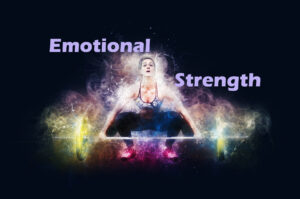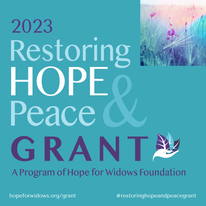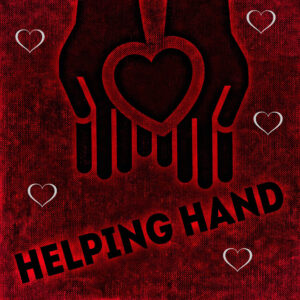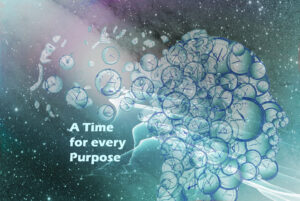One of the things I miss the most about my husband was our strong emotional connection. We shared a common unspoken language by staying alert and knowledgeable of each other’s needs, problems, likes and dislikes, strengths and weaknesses. It was a synergy between two personalities that created a balance between pushing the other toward growth and remaining a comfortable place to fall. This intimate bond we shared was a companionship I am very thankful for. It was trust, understanding and deep love woven into a strong bond where we found a balance in emotional strength because we each gave and took strength from each other.
Losing this anchoring strength when my husband moved to Heaven has been very difficult. There’s no one else in my world I can so count on now as I face the joys, burdens, day to day duties and routines, much less face the life altering situations his death unleashed.
Widowhood is the irony of knowing if that one person was here to be your support, you would have the strength to grieve that one person. The thought twists and confuses you. If only they were here to hold you and talk to you, you’d have the tenacity to tackle this unwanted life. To tackle the arduous task of moving on without them.
From the Poem Widowhood by Alisha Bozarth
 When the funeral service or memorial celebration is over… and an appropriate amount of ceremony and engagement by family and friends has been accomplished… the ever popular and often empty, if not endearing, statement is voiced—let us know if you need anything.
When the funeral service or memorial celebration is over… and an appropriate amount of ceremony and engagement by family and friends has been accomplished… the ever popular and often empty, if not endearing, statement is voiced—let us know if you need anything.
For the most part I think good friends and family would love to help. Many are unclear on what that means or what might be considered interfering. They place the burden on the widow to take the lead and tell them. Most are completely unaware how crippling and overwhelming grief can be on a widow and the emotional rollercoaster she is riding.
In those early months especially, it can be difficult for a widow to ask for help and establish new relationships with the capacity to begin to build new emotional connection. Where we once had one primary person we could count on at so many levels, we now need to discover where we might already possess strength in ourself and where we need reinforcement from outside. What our husband gave us was available 24/7. Now we will most likely find support much more limited because our lives will not overlap at that level and each person we might find will already have hinderances and obligations we need to allow for.
This is an area of my life where my faith is crucial and vital. The people around us have a limited capacity to support someone else’s emotional wellbeing. Our Heavenly Father created us and knows us intimately and better than we know ourselves. When we seek Him and ask Him to heal us and give us the courage and ability to build our emotional strength, He is willing and able to do it. He can pour His wisdom in us and help us fight the fear we all face so we can grow confident and capable.
Widowhood is one of those life experiences where emotional strength is essential. In order to survive and thrive, widows are forced to face one of life’s fiercest and most excruciating challenges. We can meet and conquer this challenge by purposefully developing and building our emotional strength.
 Emotional strength is a worthy pursuit. Emotional strength is our capacity to feel and be open to intense emotional experiences and grapple with the unpleasant feelings. It’s about facing and dealing with obstacles and recovering instead of allowing the feelings to get buried or incapacitate us. It’s about being honest and knowing when and where to ask for help.
Emotional strength is a worthy pursuit. Emotional strength is our capacity to feel and be open to intense emotional experiences and grapple with the unpleasant feelings. It’s about facing and dealing with obstacles and recovering instead of allowing the feelings to get buried or incapacitate us. It’s about being honest and knowing when and where to ask for help.
Emotionally strong people are capable of facing life’s challenges from their experience in effectively handling unpleasant feelings like grief, sadness, shame, helplessness, anger, embarrassment, disappointment, frustration, and vulnerability. Being capable is an entirely internal drive to grab control of these emotions and funnel that energy into finding and making choices that will steer us forward to a better future.
If we weren’t successful doing this in the past, we evaluate what we may have done wrong and seek guidance to find strategies that will work. Seeking God’s wisdom is a great place to start. Availing ourselves of bereavement support groups, widows groups, and qualified counseling are other good options.
Expressing these emotions is part of the healing process, including having a good cry. Keeping everything pent up inside will only create a ticking timebomb that will likely explode at the worse possible moment. Tears are usually a sign of frustration and disappointment, not defeat. Releasing the internal chaos in a healthy way through tears or screaming into a pillow allows the poison these negative feelings produce to dissipate, calm you down, and make it possible to think more clearly. What you choose to believe about your future chances of success and how discouraged you feel in the long term is far more important than how your tear ducts respond to stress and bad news.
Emotional strength also requires being resourceful. We need to be able to embrace the dependent side of our nature. I don’t relish this part. I prefer to be independent and do things on my own. I would much rather be the one who helps someone else than to ask for help. This can be hard for a lot of people, not just widows.
True emotional strength requires feeling vulnerable, courageous, and comfortable enough inside yourself to recognize when you need help. It is not about turning a negative into a pleasurable experience. It’s where you learn to feel all emotional experiences at a deeper level by allowing yourself to be responsive to your own emotions. When you can do that, you are more apt to openly and genuinely acknowledge your specific needs and limitations. You acquire the skill to change how you perceive emotion in your life.
When you can recognize this, you are able to take the next, most essential move—asking for help. Asking for help is a crucial part of what it takes to be emotionally strong. Asking opens the door to the last step: to receive graciously.
This is especially important for widows. For most of us, widowhood is not just a three month, or one year, or even a few years journey. It can go on for the rest of our lives. When this reality finally sinks in, we realize we need to prepare for the long haul. We all have limitations. We all have things we are really skilled at, good enough to get along with, and then those things that are beyond our ability, strength, or knowledge.
I got really sick just before Christmas. I am all alone now. I spent eight days barely able to get myself to the bathroom, much less anything else. It took me two months to get strong enough to start managing my usual routine again. It really shook me up. I was forced to face the fact I need to establish some failsafe’s and create a viable support system around myself. Life is too fragile and unpredictable to risk not doing this.
I still struggle with asking for help. What I started to do, is be more honest about my situation and graciously accept help offered to me. I’m praying as I keep doing this, it will get a bit easier, and I can open up more. I didn’t struggle asking for help for my husband as he went through his debilitating illness. I don’t have trouble asking for help for other people or causes. I feel a sense of satisfaction when I can be of service to those around me. I just need to learn to apply this for myself, and allow someone else to experience that satisfaction.
True emotional strength is achieved when we accept help where and when we need it. It is being able to acknowledge it is appropriate to accept what is good and feel grateful for the appreciation and support of others. When others extend us their assistance, wisdom, gifts, availability, time, talents, or enthusiasm, there is no question they are giving of themselves. When we kindly and humbly receive their generosity, it not only meets whatever needs we may have, it also honors them. When we allow ourselves to accept the heartfelt generosity of others, we reach that harmonious balance between independence and dependence.
I feel like Father God is gently but firmly trying to help me accept the help I need and to ask for it. He is teaching me there is a time and a season for everything.
To everything there is a season,
A time for every purpose under heaven:
A time to be born,
And a time to die;
A time to plant,
And a time to pluck what is planted;
A time to kill,
And a time to heal;
A time to break down,
And a time to build up;
A time to weep,
And a time to laugh;
A time to mourn,
And a time to dance;
A time to cast away stones,
And a time to gather stones;
A time to embrace,
And a time to refrain from embracing;
A time to gain,
And a time to lose;
A time to keep,
And a time to throw away;
A time to tear,
And a time to sew;
A time to keep silence,
And a time to speak;
A time to love,
And a time to hate;
A time of war,
And a time of peace.
Ecclesiastes 3: 1-8
Most of my life has been my time to give and serve others. It is perfectly okay to have a time when I need to receive from others. Some of the struggles we face as widows can be too much for us because we are only human. I want to find that balance and be an example for others who follow.
I encourage you, wherever you are on your journey through widowhood, to find that inner resolve to build your own emotional strength with deliberate intention. Consider where you might be now and where you want to see yourself maybe a year from now. It will help you be more resilient and courageous as we continue to meet old and new challenges in this journey. God bless you.
 *Have you heard about Hope for Widows Foundation’s annual Restoring Hope & Peace Grant program? It was established by the organization in 2019 to help widowed women offset financial challenges as they navigate their healing journey. You can find out details, timeline and the history of this grant here: https://hopeforwidows.org/grant/ All widows based in U.S. and Canada are encouraged to apply. Applications are now open on National Widows Day, May 3, 2023. For additional questions feel free to email info@hopeforwidows.org *
*Have you heard about Hope for Widows Foundation’s annual Restoring Hope & Peace Grant program? It was established by the organization in 2019 to help widowed women offset financial challenges as they navigate their healing journey. You can find out details, timeline and the history of this grant here: https://hopeforwidows.org/grant/ All widows based in U.S. and Canada are encouraged to apply. Applications are now open on National Widows Day, May 3, 2023. For additional questions feel free to email info@hopeforwidows.org *




It will be year 3 in 2months.
This journey has been hard. It is now worse than the beginning. So many have stepped back family , friends. This has left me feeling abandoned. Result of this makes fear grow and depression. It’s like a spiral into deeper dark place. Counseling doesn’t seem to get anywhere. I want to be strong and well. I try to go to church, it takes all my courage to go.
After 43+ yrs with him, this is one is one of the hardest to go without him.
Who will really listen and understand? Who will love me and care? Will I ever feel arms around me again?
God blessed us with 5 kids that are adults and families of their own. Only one is not far away and is too busy for me. The 12th grand child and the first without him will come next month. With many miles apart I just miss them all so much. I will travel and meet this new grandchild. And goodbyes are excruciating.